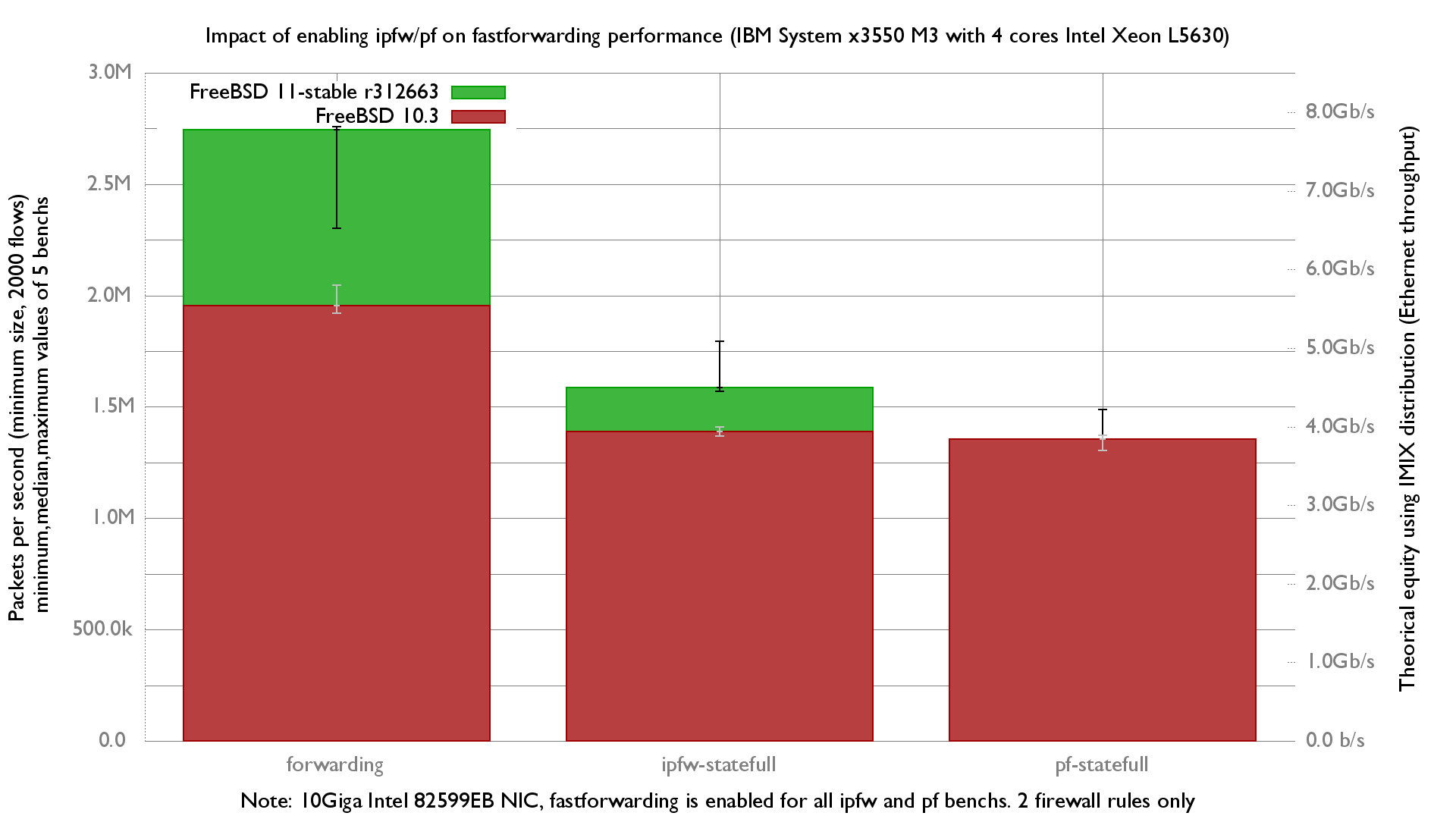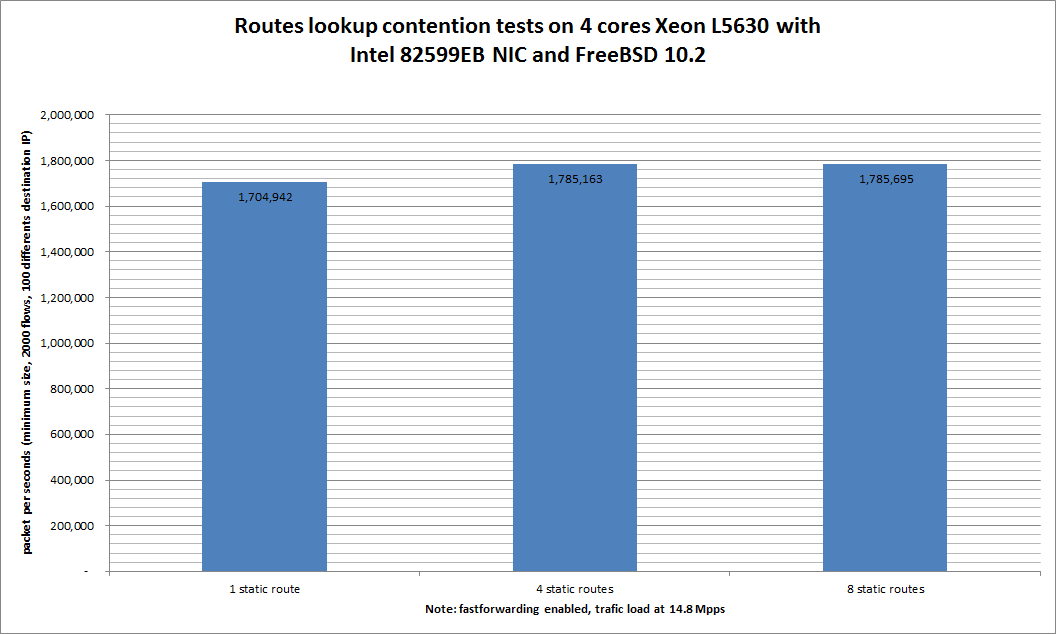- en
- fr
Table of Contents
Forwarding performance lab of an IBM System x3550 M3 with 10-Gigabit Intel 82599EB
Forwarding performance lab of a quad cores Xeon 2.13GHz and dual-port Intel 82599EB 10-Gigabit
Bench lab
Hardware detail
This lab will test an IBM System x3550 M3 with quad cores (Intel Xeon L5630 2.13GHz, hyper-threading disabled), dual port Intel 82599EB 10-Gigabit and OPT SFP (SFP-10G-LR).
NIC details:
ix0@pci0:21:0:0: class=0x020000 card=0x00038086 chip=0x10fb8086 rev=0x01 hdr=0x00
vendor = 'Intel Corporation'
device = '82599EB 10-Gigabit SFI/SFP+ Network Connection'
class = network
subclass = ethernet
bar [10] = type Prefetchable Memory, range 64, base 0xfbe80000, size 524288, enabled
bar [18] = type I/O Port, range 32, base 0x2020, size 32, enabled
bar [20] = type Prefetchable Memory, range 64, base 0xfbf04000, size 16384, enabled
cap 01[40] = powerspec 3 supports D0 D3 current D0
cap 05[50] = MSI supports 1 message, 64 bit, vector masks
cap 11[70] = MSI-X supports 64 messages, enabled
Table in map 0x20[0x0], PBA in map 0x20[0x2000]
cap 10[a0] = PCI-Express 2 endpoint max data 256(512) FLR link x8(x8)
speed 5.0(5.0) ASPM disabled(L0s)
ecap 0001[100] = AER 1 0 fatal 0 non-fatal 1 corrected
ecap 0003[140] = Serial 1 90e2baffff842038
ecap 000e[150] = ARI 1
ecap 0010[160] = SR-IOV 1 IOV disabled, Memory Space disabled, ARI disabled
0 VFs configured out of 64 supported
First VF RID Offset 0x0180, VF RID Stride 0x0002
VF Device ID 0x10ed
Page Sizes: 4096 (enabled), 8192, 65536, 262144, 1048576, 4194304
Lab set-up
The lab is detailed here: Setting up a forwarding performance benchmark lab.
Diagram
+------------------------------------------+ +-------+ +------------------------------+ | Device under test | |Juniper| | Packet generator & receiver | | | | QFX | | | | ix0: 198.18.0.1/24 |=| < |=| vcxl0: 198.18.0.110/24 | | 2001:2::1/64 | | | | 2001:2::110/64 | | (90:e2:ba:84:20:38) | | | | (00:07:43:2e:e4:72) | | | | | | | | ix1: 198.19.0.1/24 |=| > |=| vcxl1: 198.19.0.110/24 | | 2001:2:0:8000::1/64 | | | | 2001:2:0:8000::110/64 | | (90:e2:ba:84:20:39) | +-------+ | (00:07:43:2e:e4:7a) | | | | | | static routes | | | | 192.18.0.0/16 => 198.18.0.110 | | | | 192.19.0.0/16 => 198.19.0.110 | | | | 2001:2::/49 => 2001:2::110 | | | | 2001:2:0:8000::/49 => 2001:2:0:8000::110 | | | | | | | | static arp and ndp | | /boot/loader.conf: | | 198.18.0.110 => 00:07:43:2e:e4:72 | | hw.cxgbe.num_vis=2 | | 2001:2::110 | | | | | | | | 198.19.0.110 => 00:07:43:2e:e4:7a | | | | 2001:2:0:8000::110 | | | +------------------------------------------+ +------------------------------+
The generator MUST generate lot's of smallest IP flows (multiple source/destination IP addresses and/or UDP src/dst port).
Here is an example for generating 2000 IPv4 flows (100 destination IP addresses * 20 source IP addresses) with a Chelsio NIC:
pkt-gen -i vcxl0 -f tx -n 1000000000 -l 60 -d 198.19.10.1:2000-198.19.10.100 -D 90:e2:ba:84:20:38 -s 198.18.10.1:2000-198.18.10.20 -w 4 -p 2
And the same with IPv6 flows (minimum frame size of 62 here):
pkt-gen -f tx -i vcxl0 -n 1000000000 -l 62 -6 -d "[2001:2:0:8010::1]-[2001:2:0:8010::64]" -D 90:e2:ba:84:20:38 -s "[2001:2:0:10::1]-[2001:2:0:10::14]" -S 00:07:43:2e:e4:72 -w 4 -p 2
Receiver will use this command:
pkt-gen -i vcxl1 -f rx -w 4
</code>
Basic configuration
Disabling Ethernet flow-control
First, disable Ethernet flow-control on both servers:
echo "dev.ix.0.fc=0" >> /etc/sysctl.conf echo "dev.ix.1.fc=0" >> /etc/sysctl.conf
Enabling unsupported SFP
Because we are using a non-Intel SFP:
mount -uw / echo 'hw.ix.unsupported_sfp="1"' >> /boot/loader.conf.local mount -ur /
Disabling LRO and TSO
A router should not use LRO and TSO. BSDRP disable by default using a RC script (disablelrotso_enable=“YES” in /etc/rc.conf.misc).
But on a standard FreeBSD:
ifconfig ix0 -tso4 -tso6 -lro ifconfig ix1 -tso4 -tso6 -lro
IP configuration on DUT
# IPv4 router gateway_enable="YES" static_routes="generator receiver" route_generator="-net 198.18.0.0/16 198.18.0.110" route_receiver="-net 198.19.0.0/16 198.19.0.110" ifconfig_ix0="inet 198.18.0.1/24 -tso4 -tso6 -lro" ifconfig_ix1="inet 198.19.0.1/24 -tso4 -tso6 -lro" static_arp_pairs="HPvcxl0 HPvcxl1" static_arp_HPvcxl0="198.18.0.110 00:07:43:2e:e4:72" static_arp_HPvcxl1="198.19.0.110 00:07:43:2e:e4:7a" # IPv6 router ipv6_gateway_enable="YES" ipv6_activate_all_interfaces="YES" ipv6_static_routes="generator receiver" ipv6_route_generator="2001:2:: -prefixlen 49 2001:2::110" ipv6_route_receiver="2001:2:0:8000:: -prefixlen 49 2001:2:0:8000::110" ifconfig_ix0_ipv6="inet6 2001:2::1 prefixlen 64" ifconfig_ix1_ipv6="inet6 2001:2:0:8000::1 prefixlen 64" static_ndp_pairs="HPvcxl0 HPvcxl1" static_ndp_HPvcxl0="2001:2::110 00:07:43:2e:e4:72" static_ndp_HPvcxl1="2001:2:0:8000::110 00:07:43:2e:e4:7a"
Routing performance with default BSDRP value
Default fast-forwarding performance in front of a line-rate generator
Behaviour in front of a multi-flow traffic generator at line-rate 14.8Mpps (thanks Chelsio!), netstat on DUT report:
Can't enter any command on the DUT during the load: All 4 cores are overloaded.
But on the receiver, there is only 2.8Mpps received (then forwarded):
242.851700 main_thread [2277] 2870783 pps (2873654 pkts 1379353920 bps in 1001000 usec) 17.79 avg_batch 3584 min_space 243.853699 main_thread [2277] 2869423 pps (2875162 pkts 1380077760 bps in 1002000 usec) 17.77 avg_batch 1956 min_space 244.854700 main_thread [2277] 2870532 pps (2873403 pkts 1379233440 bps in 1001000 usec) 17.78 avg_batch 2022 min_space 245.855699 main_thread [2277] 2872424 pps (2875296 pkts 1380142080 bps in 1001000 usec) 17.79 avg_batch 1949 min_space 246.856699 main_thread [2277] 2871882 pps (2874754 pkts 1379881920 bps in 1001000 usec) 17.79 avg_batch 3584 min_space 247.857699 main_thread [2277] 2871047 pps (2873918 pkts 1379480640 bps in 1001000 usec) 17.78 avg_batch 3584 min_space 248.858700 main_thread [2277] 2870945 pps (2873816 pkts 1379431680 bps in 1001000 usec) 17.79 avg_batch 1792 min_space 249.859699 main_thread [2277] 2870647 pps (2873518 pkts 1379288640 bps in 1001000 usec) 17.78 avg_batch 1959 min_space 250.860699 main_thread [2277] 2870222 pps (2873092 pkts 1379084160 bps in 1001000 usec) 17.78 avg_batch 1956 min_space 251.861699 main_thread [2277] 2870311 pps (2873178 pkts 1379125440 bps in 1000999 usec) 17.78 avg_batch 1792 min_space 252.862699 main_thread [2277] 2870795 pps (2873669 pkts 1379361120 bps in 1001001 usec) 17.78 avg_batch 2024 min_space
The traffic is correctly load-balanced between each queues:
[root@DUT]~# sysctl dev.ix.0. | grep rx_packet dev.ix.0.queue3.rx_packets: 143762837 dev.ix.0.queue2.rx_packets: 141867655 dev.ix.0.queue1.rx_packets: 140704642 dev.ix.0.queue0.rx_packets: 139301732 [root@R1]~# sysctl dev.ix.1. | grep tx_packet dev.ix.1.queue3.tx_packets: 143762837 dev.ix.1.queue2.tx_packets: 141867655 dev.ix.1.queue1.tx_packets: 140704643 dev.ix.1.queue0.tx_packets: 139301734
Where the system spend this time?
[root@DUT]~# kldload hwpmc [root@DUT]~# pmcstat -TS instructions -w1 PMC: [INSTR_RETIRED_ANY] Samples: 99530 (100.0%) , 0 unresolved %SAMP IMAGE FUNCTION CALLERS 6.5 kernel ixgbe_rxeof ixgbe_msix_que 5.8 kernel bzero m_pkthdr_init:1.7 ip_tryforward:1.5 ip_findroute:1.4 fib4_lookup_nh_basic:1.3 5.1 kernel ixgbe_xmit ixgbe_mq_start_locked 3.7 kernel ixgbe_mq_start ether_output 2.8 kernel rn_match fib4_lookup_nh_basic 2.7 kernel _rw_runlock_cookie fib4_lookup_nh_basic:2.0 arpresolve:0.8 2.7 kernel ip_tryforward ip_input 2.6 kernel ether_nh_input netisr_dispatch_src 2.6 kernel bounce_bus_dmamap_lo bus_dmamap_load_mbuf_sg 2.6 kernel uma_zalloc_arg ixgbe_rxeof 2.6 kernel _rm_rlock in_localip 2.4 kernel netisr_dispatch_src ether_demux:1.7 ether_input:0.7 2.3 libc.so.7 bsearch 0x63ac 2.2 kernel ether_output ip_tryforward 2.2 kernel ip_input netisr_dispatch_src 2.1 kernel uma_zfree_arg m_freem 2.1 kernel fib4_lookup_nh_basic ip_findroute 1.9 kernel __rw_rlock arpresolve:1.3 fib4_lookup_nh_basic:0.6 1.8 kernel bus_dmamap_load_mbuf ixgbe_xmit 1.7 kernel bcopy arpresolve 1.6 kernel m_adj ether_demux 1.5 kernel memcpy ether_output 1.5 kernel arpresolve ether_output 1.5 kernel _mtx_trylock_flags_ ixgbe_mq_start 1.4 kernel mb_ctor_mbuf uma_zalloc_arg 1.4 kernel ixgbe_txeof ixgbe_msix_que 1.3 pmcstat 0x63f0 bsearch 1.1 pmcstat 0x63e3 bsearch 1.0 kernel ixgbe_refresh_mbufs ixgbe_rxeof 1.0 kernel in_localip ip_tryforward 1.0 kernel random_harvest_queue ether_nh_input 0.9 kernel bcmp ether_nh_input 0.8 kernel cpu_search_lowest cpu_search_lowest 0.8 kernel mac_ifnet_check_tran ether_output 0.8 kernel critical_exit uma_zalloc_arg 0.7 kernel critical_enter 0.7 kernel ixgbe_mq_start_locke ixgbe_mq_start 0.6 kernel mac_ifnet_create_mbu ether_nh_input 0.6 kernel ether_demux ether_nh_input 0.5 kernel m_freem ixgbe_txeof 0.5 kernel ipsec4_capability ip_input
⇒ Time spend in ixgbe_rxeof
Equilibrium throughput
Previous methodology, by generating 14.8Mpps, is like testing the DUT under a “Denial-of-Service”. Try another methodology known as equilibrium throughput.
From the pkt-generator, start an estimation of the “equilibrium throughput” starting at 4Mpps:
[root@pkt-gen]~# equilibrium -d 90:e2:ba:84:20:38 -p -l 4000 -t vcxl0 -r vcxl1 Benchmark tool using equilibrium throughput method - Benchmark mode: Throughput (pps) for Router - UDP load = 18B, IPv4 packet size=46B, Ethernet frame size=60B - Link rate = 4000 Kpps - Tolerance = 0.01 Iteration 1 - Offering load = 2000 Kpps - Step = 1000 Kpps - Measured forwarding rate = 1999 Kpps Iteration 2 - Offering load = 3000 Kpps - Step = 1000 Kpps - Trend = increasing - Measured forwarding rate = 2949 Kpps Iteration 3 - Offering load = 2500 Kpps - Step = 500 Kpps - Trend = decreasing - Measured forwarding rate = 2499 Kpps Iteration 4 - Offering load = 2750 Kpps - Step = 250 Kpps - Trend = increasing - Measured forwarding rate = 2750 Kpps Iteration 5 - Offering load = 2875 Kpps - Step = 125 Kpps - Trend = increasing - Measured forwarding rate = 2875 Kpps Iteration 6 - Offering load = 2937 Kpps - Step = 62 Kpps - Trend = increasing - Measured forwarding rate = 2933 Kpps Iteration 7 - Offering load = 2968 Kpps - Step = 31 Kpps - Trend = increasing - Measured forwarding rate = 2948 Kpps Estimated Equilibrium Ethernet throughput= 2948 Kpps (maximum value seen: 2949 Kpps)
⇒ Same results with equilibrium method: 2.9Mpps.
Firewall impact
One rule for each firewall and 2000 UDP “sessions”, more information on the GigaEthernet performance lab.
Routing performance with multiples static routes
FreeBSD had some route lookup contention problem: This setup is using only one static route (192.19.0.0/8) toward the traffic receiver.
By spliting this unique route by 4 or 8, we should obtain better result.
This bench method is using 100 differents destinations IP addressess from 198.19.10.1 to 198.19.10.100, then redoing this bench using 4 static routes:
- 198.19.10.0/27 (0 to 31)
- 198.19.10.32/27 (32 to 63)
- 198.19.10.64/27 (64 to 95)
- 198.19.10.96/27 (96 to 127)
then with 8 routes:
- 198.19.10.0/28
- 198.19.10.16/28
- 198.19.10.32/28
- 198.19.10.48/28
- 198.19.10.64/28
- 198.19.10.80/28
- 198.19.10.96/28
- 198.19.10.112/28
Configuration examples:
sysrc static_routes="generator receiver1 receiver2 receiver3 receiver4" sysrc route_generator="-net 198.18.0.0/16 198.18.2.2" sysrc -x route_receiver sysrc route_receiver1="-net 198.19.10.0/27 198.19.2.2" sysrc route_receiver2="-net 198.19.10.32/27 198.19.2.2" sysrc route_receiver3="-net 198.19.10.64/27 198.19.2.2" sysrc route_receiver4="-net 198.19.10.96/27 198.19.2.2"
Graphs
Ministat
x pps.one-route
+ pps.four-routes
* pps.eight-routes
+--------------------------------------------------------------------------+
| * |
| * |
| x x + + * x x + + **|
||_________M______A________________| |
| |_________M_______________A________________________| |
| |_______M____________________A_____________________________| |
+--------------------------------------------------------------------------+
N Min Max Median Avg Stddev
x 5 1639912 1984116 1704942 1769454.2 154632.18
+ 5 1737180 2194547 1785163 1927662.8 229585.57
No difference proven at 95.0% confidence
* 5 1782648 2273933 1785695 1978219.6 266278.12
No difference proven at 95.0% confidence


